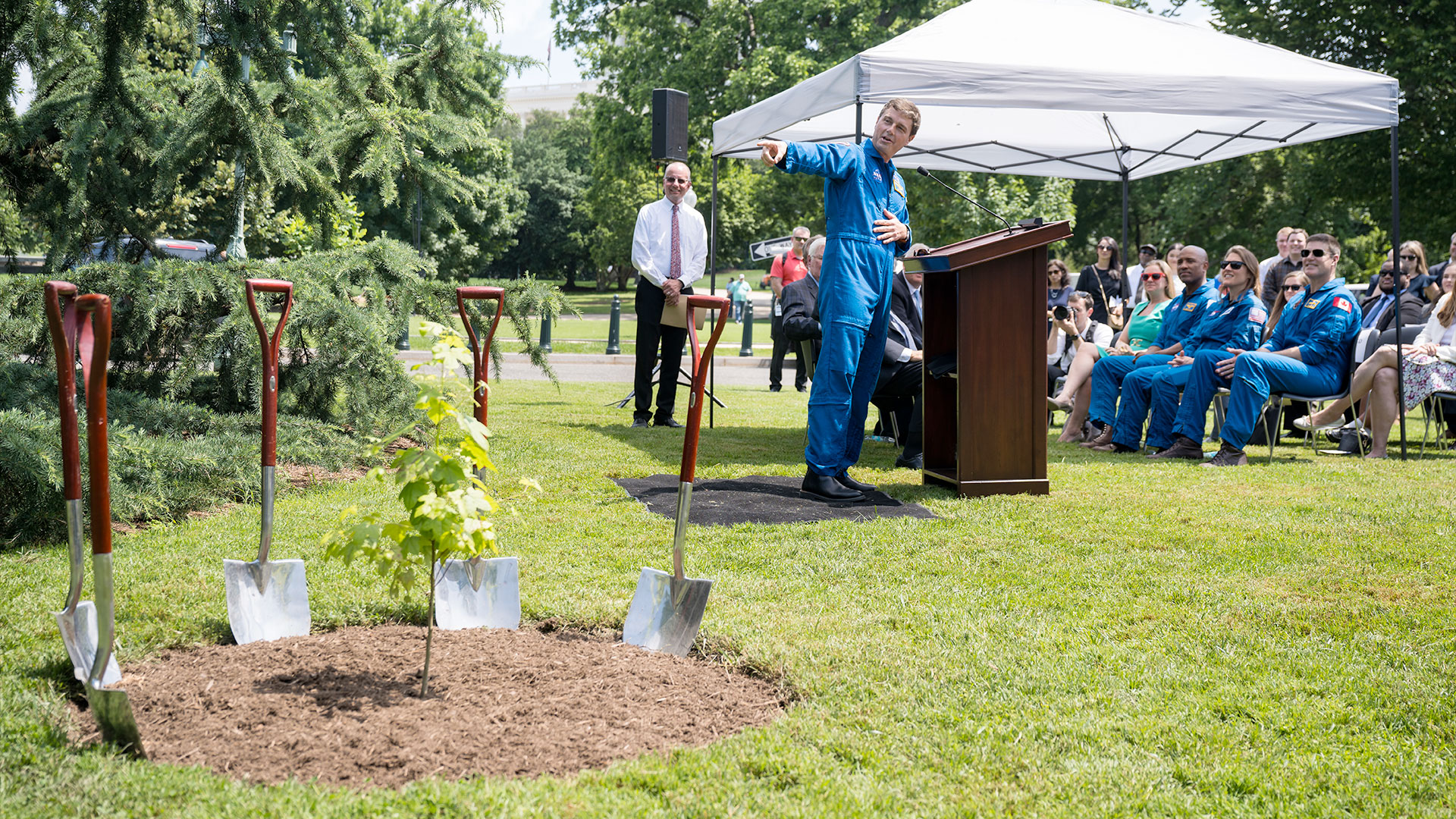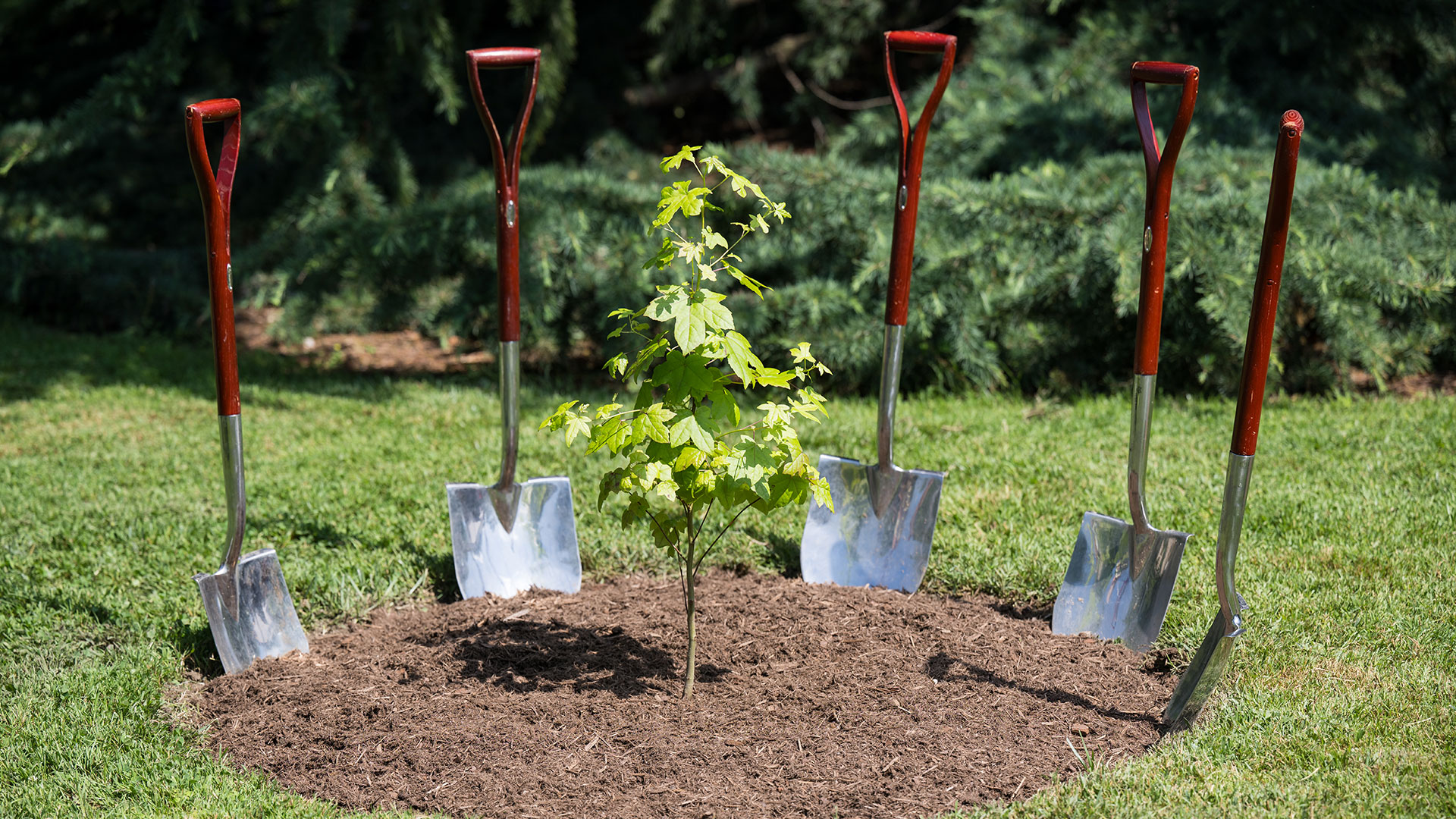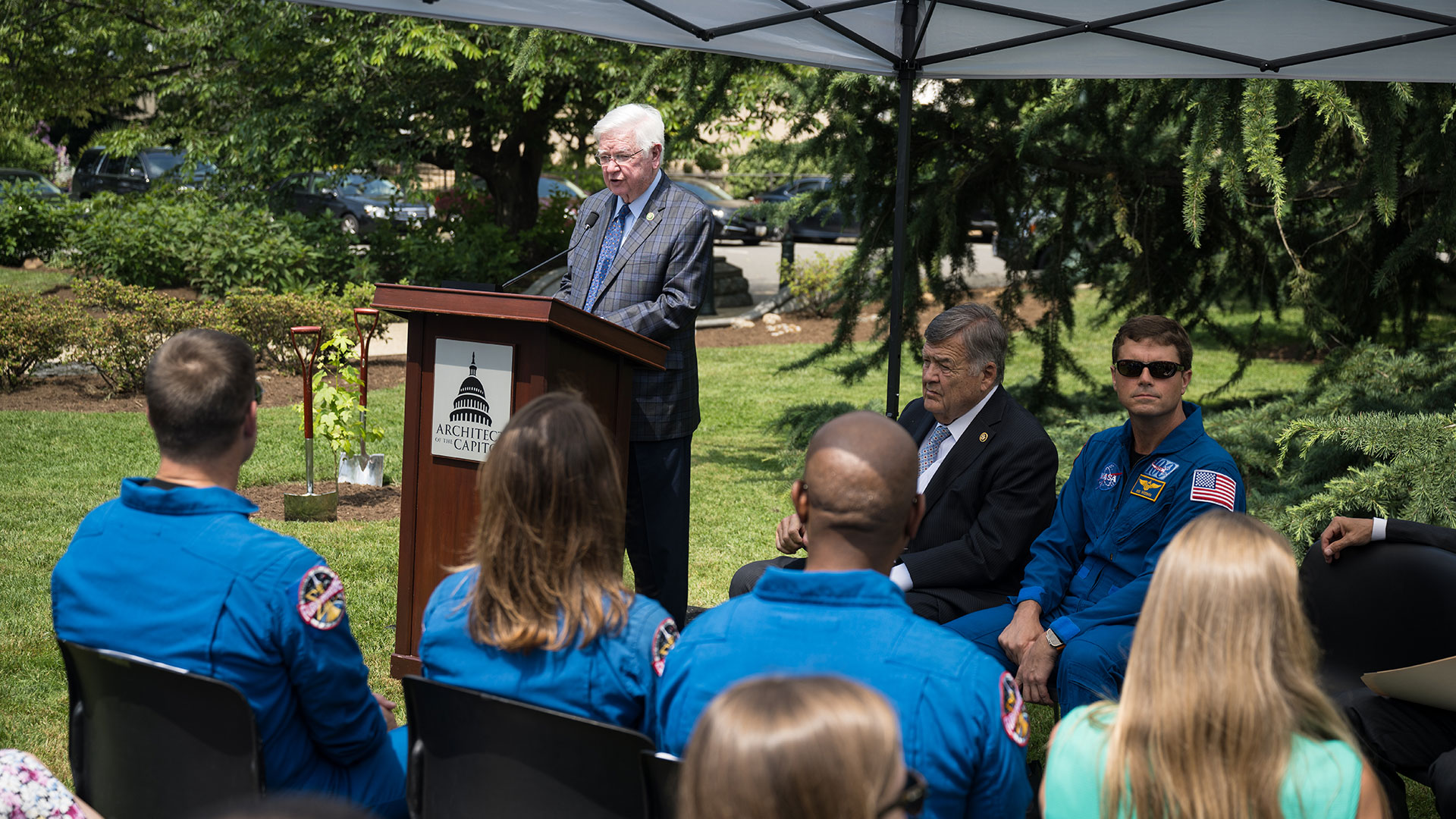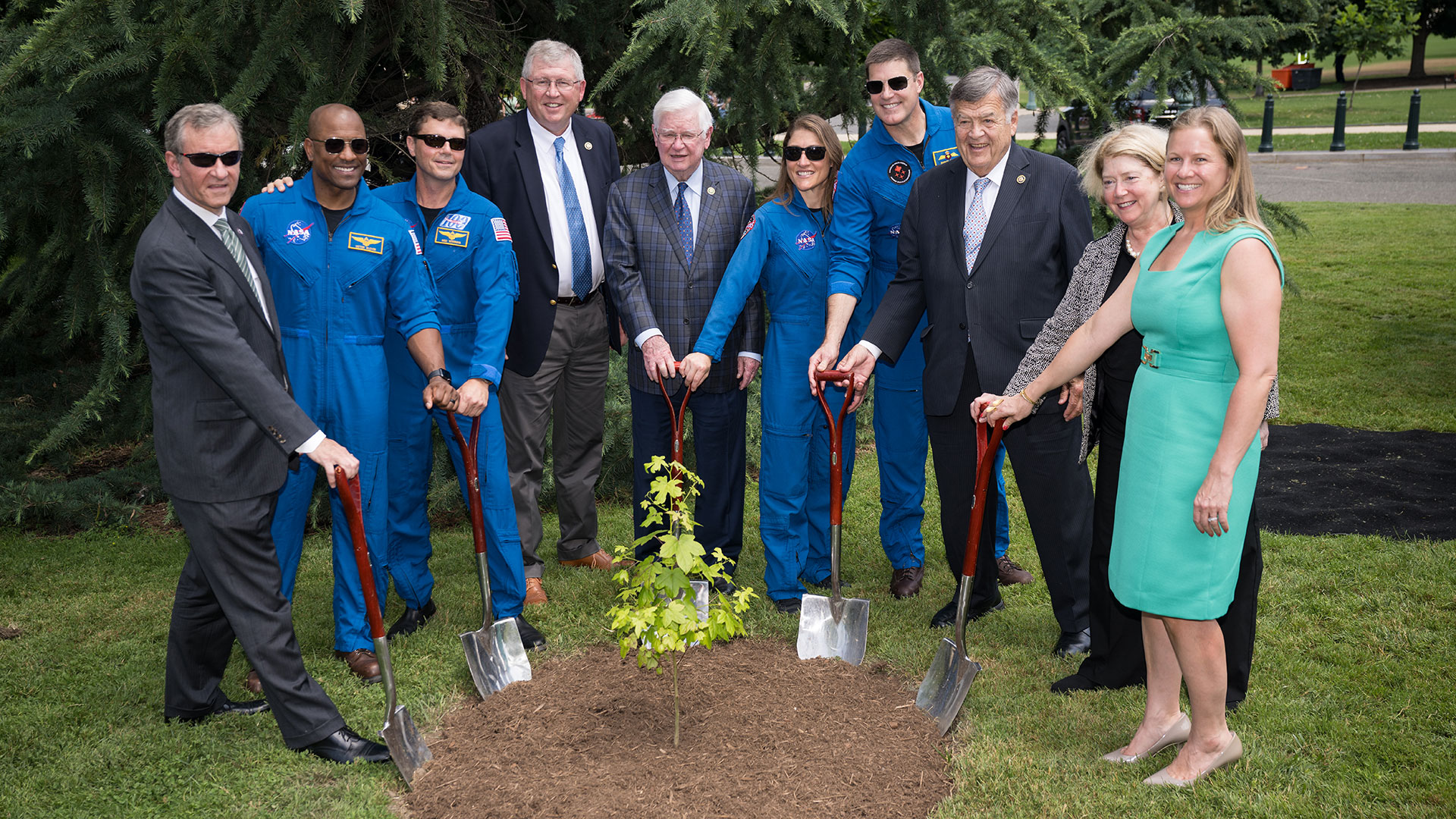'Most unique tree here:' Artemis Moon Tree planted at US Capitol
'It represents so much of our mission.'

Reid Wiseman felt a little jealous about the tree that he and his crewmates helped dedicate on U.S. Capitol grounds on Tuesday (June 4).
The NASA astronaut, who is assigned to command Artemis 2, the next mission to fly humans to the moon after a more than 50 year hiatus, was, in a way, beaten to the punch by the sapling. Wiseman will not launch until late 2025, at the earliest.
"That little sweetgum has been to the moon and it has come back and it is now sitting here," said Wiseman, who was joined at the tree planting ceremony by his three fellow moon-bound astronauts, pilot Victor Glover and mission specialist Christina Koch of NASA and Canadian Space Agency mission specialist Jeremy Hansen. "I think about this tree growing maybe about 'that tall' as we are finished with Artemis 2 and we're back."
Related: NASA's Artemis 2 mission: Everything you need to know
The sweetgum's journey began before it sprouted. As one of more than 1,000 seeds of five different species of tree flown on NASA's 2022 uncrewed Artemis I mission, the sweetgum reached distances farther than any human has flown as it completed a 26-day mission around the moon and back to Earth. Inspired by a similar symbolic set of seeds flown on the Apollo 14 mission in 1971, these new seeds and the saplings they have since become have been dubbed by NASA the "Artemis Moon Trees."
Now, the space agency is beginning to deliver the trees to be planted where they can serve as a long-lasting point of inspiration and remind those who see them of what NASA is trying to achieve with the Artemis program.
"It represents so much of our mission," said Pam Melroy, NASA's deputy administrator and a former astronaut. "It's a mission that touches every one, that everyone can enjoy, that everyone can be inspired by, but also one that we have an obligation to steward and protect to go forward. This is a mission whose impact will last, just like this tree, not just for decades, but for centuries."
It is NASA's aim to return humans to the moon for the first time since the Apollo program, land the first woman and first person of color, as well as the first non-American to step foot on the lunar surface, all while exploring a new area of the moon, the south pole, in order to learn what it takes to send astronauts to Mars.
"Space has the power to unite us and to bring us together, just like this tree. It represents a hope that blooms in all of us for what we can achieve as we are in the golden era of space exploration," said Melroy.
The sweetgum was planted at the west front of the Capitol, near Independence Avenue and First Street SE, outside of the Rayburn House Office Building in Washington, DC. It is now among the more than 4,800 trees that stand on the Capitol Grounds.
"The U.S. Capitol grounds were designed by famed landscape architect Frederick Law Olmsted in 1874. Now, more than 140 years later, we continue to follow his plan for creating an urban oasis here at our nation's capital, using nature to highlight the beauty of the U.S. Capitol," said Jim Kaufmann, director of the Capitol grounds and arboretum for the architect of the Capitol. "I do believe that due to the work of many people, this tree is now the most unique tree here as part of our arboretum."
"We are honored to provide a home for one of these incredible Moon Trees on the U.S. Capitol grounds," said Kaufmann.
Tuesday's ceremony was hosted by Rep. Hal Rogers of Kentucky. In addition to Kaufman, Melroy and the Artemis 2 astronauts, congressmen Matt Cartwright of Pennsylvania and Frank Lucas of Oklahoma delivered remarks, as did Carrie Goodge, minister for congressional, public and intergovernmental affairs at the Canadian Embassy.
"I was proud to join my House and Senate colleagues to request a tree be planted here on the Capitol grounds in honor of NASA's Artemis mission," said Rogers. "It's my hope that this Artemis Moon Tree will not only beautify the Capitol grounds, but also serve as a reminder of American leadership in space, inspire young minds and commemorate the brave men and women who dare fly into space."
Wiseman concluded the event by envisioning the day he revisits the tree in the not too far off future.
"Now I'm an old man, maybe 75 years old, and I walked down out of Rayburn and I walked down this historic path and I look over the tree. And I just sit down for a minute under its shade and I read my favorite book. And as I do that, I wink up at the stars, because there are probably a few kids here who will be living and working on Mars at that point and we will have come full circle. And I will love it," he said. "Thank you sweetgum."
Follow collectSPACE.com on Facebook and on Twitter at @collectSPACE. Copyright 2024 collectSPACE.com. All rights reserved.
Breaking space news, the latest updates on rocket launches, skywatching events and more!

Robert Pearlman is a space historian, journalist and the founder and editor of collectSPACE.com, a daily news publication and community devoted to space history with a particular focus on how and where space exploration intersects with pop culture. Pearlman is also a contributing writer for Space.com and co-author of "Space Stations: The Art, Science, and Reality of Working in Space” published by Smithsonian Books in 2018.
In 2009, he was inducted into the U.S. Space Camp Hall of Fame in Huntsville, Alabama. In 2021, he was honored by the American Astronautical Society with the Ordway Award for Sustained Excellence in Spaceflight History. In 2023, the National Space Club Florida Committee recognized Pearlman with the Kolcum News and Communications Award for excellence in telling the space story along the Space Coast and throughout the world.




